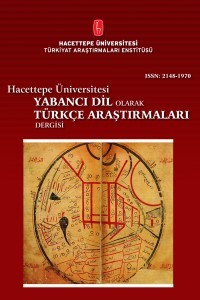“Kekemelik” Türk ve Alman Çocuklarında Kimlik Oluşumunda Bir Problem
İnsanların kimlik oluşumu anne karnında başlar. Doğumdan sonra kimlik oluşumu dış dünya tarafından şekillendirilir. Kimlik oluşumunda önemli etkenlerden biri toplumdur. Bu çalışmada Türk ve Alman ailelerin çocuk yetiştirme biçimleri tartışılmakta ve karşılaştırılmaktadır. Ebeveynlerin bilişsel evreden itibaren çocuklarına davranış biçimleri büyük rol oynamaktadır, bilişsel evre, çocuğun dört yaşından sonra başlamaktadır. Çocuk kendi kimliğini günlük deneyimler yoluyla oluşturur. Kimlik oluşumu evresinde çocuk için fiziksel dezavantajı olan bazı sorunlar ortaya çıkabilmektedir. Bu çalışmada ağırlıklı olarak „kekeleme“ sorunu ele alınmaktadır. Duygusal Türk aile ilişkileri, rasyonel Alman yetiştirme tarzıyla karşılaştırılmaktadır. Türk ve Alman aileler yaşantımızdaki olumsuz deneyimlere nasıl tepki veriyor ve çocuklara bu tür durumlarda nasıl davranıyor? Örneğin cenaze gibi olumsuz bir durumu nasıl ele alıyor? Bu tür konular; John Lock, René Descartes, Georg Herbert Mead, Lotar Krappmann, Jean Piaget ve Mehmet Doğan Cüceloğlu'nun teorik yaklaşımları göz önünde bulundurularak incelenmiş ve çözüm önerileri oluşturulmaya çalışılmıştır.
Anahtar Kelimeler:
Kimlik oluşumu, Kekemelik, Psikodilbilim, Konuşma Bozuklukları, Toplumsal Farklılıklar
“Stuttering” as a Barrier to Identity Development of Turkish and German Children
Identity development occurs in the fetus for humans. Given that after birth, the outside world has an impact on how an identity is formed and that society is one of the key determinants of character development, thisresearch compares and contrasts the parenting practices of Turkish and German families. When a child enters the cognitive period, which starts after they turn four years old, parental interaction is crucial. The child develops his/her own personality as a result of their everyday activities. A kid may experience some issues related to physical disadvantages as they go through the identity formation process. This research focuses primarily on the "stuttering" issue. Turkish families' emotional interactions are contrasted with German families' analytical training. One of the main questions is how Turkish and German families respond to and handle traumatic events, and especially how they treat their children under such situations. More specifically, the paper looks into how al involved respond to a distressing circumstance, like a funeral. Using the theoretical frameworks of John Lock, René Descartes, Georg Herbert Mead, Lotar Krappmann, Jean Piaget, and Mehmet Doğan Cüceloğlu, this paper examines such problems and suggests solutions.
Keywords:
Identity development, stuttering, psycholinguistics, speech disorders, social differentiation,
___
- Bozkurt, S. (2018). Das Todesmotiv in der Deutschen und Türkischen Kinderliteratur (Unveröffentlichte Masterarbeit). Hacettepe Üniversitesi, Sosyal Bilimler Enstitüsü.
- Bundesvereinigung Stottern & Selbsthilfe e.V. (2021). Erste Information zum Thema Stottern. Zugriff von https://www.stottern-lv-ost.de/infosueberstottern#:~:text=Bei%20vier%20bis%20f%C3%BCnf%20Prozent,%C3%BCberwiegt%20der%20Anteil%20der%20M%C3%A4nner am 09 Juni 2021.
- Clarke, J. u.a. (1979). Jugendkulturen als Widerstand. Milieus, Rituale, Provokationen. Frankfurt am Main: Syndikat.
- Cihan, M. (2006). John Locke ve Eğitim. Atatürk Üniversitesi Sosyal Bilimler Enstitüsü Dergisi, 7(1), 173-178.
- Cüceloğlu, D. (2019). Çocuk Yetiştirmede Önemli Üç Şey. Zugriff von http://www.dogancuceloglu.net/yazilar/221/cocuk-yetistirmede-onemli-uc-sey/ am 10 Juni 2021.
- Daniel, B. (2004). Was bedeutet Identität nach Lothar Krappmann und Karl Haußer?. Rezension/Literaturbericht.
- Google, Wörterbuch. Zugriff von https://www.google.com/search?q=identit%C3%A4t+bedeutung&rlz=1C1GCEA_enTR892TR892&oq=identit%C3%A4t+bedeutung&aqs=chrome..69i57j0i19j0i19i22i30l8.2429j1j7&sourceid=chrome&ie=UTF-8 am 09 Juni 2021.
- Hecker, K. (2013). Jean Piagets Theorie der geisitigen Entwicklung. Zugriff von https://userpages.uni-koblenz.de/~proedler/autsem/piaget.pdf am 09 Juni 2021.
- Heckmann, H. & Hoffmann, E.T.A. (1993). Ritter Gluck - Das Problem der Identität. Oder: das Glück ein anderer zu sein. Berlin: Mayer Verlag.
- Held, S. (1999). Erkenntnistheorie bei John Locke (Hausarbeit). Martin- Luther- Universität, Halle Wittenberg, Fachbereich Geschichte, Philosophie und Sozialwissenschaften Institut für Politikwissenschaft.
- Homberger, D. (2010). Sachwörterbuch zur Sprachwissenschaf. Berlin: Reclam Verlag.
- Okan İbiloğlu, A. (2011). Kekemelik, Stuttering. Psikiyatride Güncel Yaklaşımlar-Current Approaches in Psychiatry, 3(4), 704-727.
- Kapsız-Fekete, N. Ş. (2016). Ein Beitrag, “Gesellschaft & Geschichten” Kind, du darfst fernsehen! “Türkische Erziehung in Deutschland”. Zugriff von https://renk-magazin.de/kind-du-darfst-fernsehen-tuerkische-erziehung-in-deutschland/ am 10 Juni 2021.
- Kossurok, A. (2010). Die Identitätstheorien nach G. H. Mead, E. Goffman und L. Krappmann (Essay).
- Krappmann, L. (1988). Soziologische Dimensionen der Identität. Stuttgart: Klett- Cotta Verlag.
- Kristen, S., Küllenberg, J. & Erne, L. (2011). Die Entwicklung des Selbst. Seminar der Entwicklungspsychologie WS2010/2011. Zugriff von https://www.psy.lmu.de/epp/studium_lehre/lehrmaterialien/lehrmaterial_ss10/wintersemester1011/lehrmat_kristen/seminar1kristen16/die_entwicklung_des.pdf am 09 Juni 2021.
- Mauny, C. (1984). Deutsch-französischer Astrophysiker und Tiefseetaucher, Aphorismen.de. 09 Haziran 2021 tarihinde https://www.aphorismen.de/ adresinden erişildi.
- Mead, G. H. (1934). Geist, Identität und Gesellschaft. Frankfurt am Main: Suhrkamp Verlag,
- Meier-Braun, K. H. & Kilgus, A. M. (Hrsg.) (2002). Integration durch Politik und Medien? 7. Medienforum Migranten bei uns. Medien und Freizeit bei Kindern türkischer Herkunft. Baden-Baden.
- Stegmüller, S. M. (2020). Mead Theorie - einfach erklärt. Zugriff von https://praxistipps.focus.de/mead-theorie-einfach-erklaert_124752 am 22 September 2021.
- Textor, M.R. (2005). Piagets Theorie der kognitiven Entwicklung. Zugriff von https://www.kindergartenpaedagogik.de/fachartikel/psychologie/1226 am 22 Juni 2021.
- ISSN: 2148-1970
- Başlangıç: 2014
- Yayıncı: Hacettepe Üniversitesi
